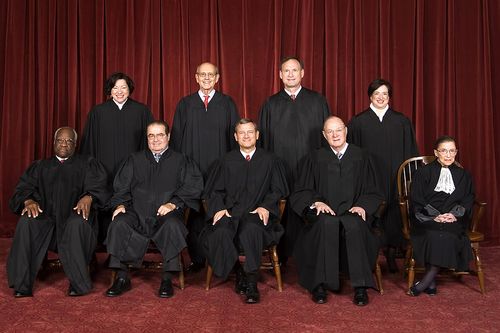The Supreme Court has announced that it will consider four cases that are challenging states' bans on same-sex marriage in Kentucky, Michigan, Ohio and Tennessee. From the Court's order:
The cases are consolidated and the petitions for writs of certiorari are granted limited to the following questions:
1) Does the Fourteenth Amendment require a state to license a marriage between two people of the same sex?
2) Does the Fourteenth Amendment require a state to recognize a marriage between two people of the same sex when their marriage was lawfully licensed and performed out-of-state?
A total of ninety minutes is allotted for oral argument on Question 1. A total of one hour is allotted for oral argument on Question 2. The parties are limited to filing briefs on the merits and presenting oral argument on the questions presented in their respective petitions. The briefs of petitioners are to be filed on or before 2 p.m., Friday, February 27, 2015. The briefs of respondents are to be filed on or before 2 p.m., Friday, March 27, 2015. The reply briefs are to be filed on or before 2 p.m., Friday, April 17, 2015.
SCOTUS Blog reports that the cases are set to be heard the week of April 24. Lyle Deniston of SCOTUS Blog weighed in on the impact the justices' decisions will have:
Taking on a historic constitutional challenge with wide cultural impact, the Supreme Court on Friday afternoon agreed to hear four new cases on same-sex marriage. The Court said it would rule on state power to ban gay and lesbian marriage and state power to refuse to recognize such marriages performed out of state.
The New York Times has heralded the decision as a move by the Court to definitively decide whether same-sex couples can marry nationwide:
The pace of change on same-sex marriage, in both popular opinion and in the courts, has no parallel in the nation's history.
Based on the court's failure to act in October [when 5 other states sought intervention from the Court to prevent same-sex marriage from taking hold] and its last three major gay rights rulings, most observers expect the court to establish a nationwide constitutional right to same-sex marriage. But the court also has a history of caution in this area.
It agreed once before to hear a constitutional challenge to a same-sex marriage ban, in 2012 in a case called Hollingsworth v. Perry that involved California's Proposition 8. At the time, nine states and the District of Columbia allowed same-sex couples to marry.
Be sure to check back for legal analysis from Towleroad's legal eagle, Ari Ezra Waldman. And read the order below:
Developing…




